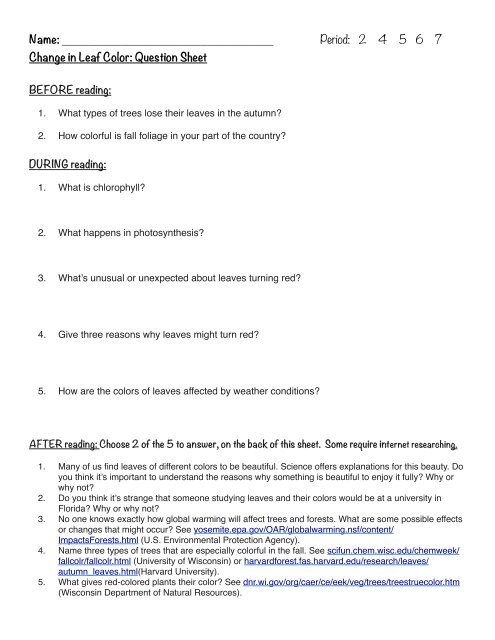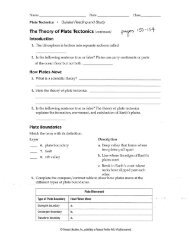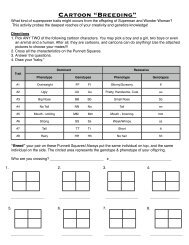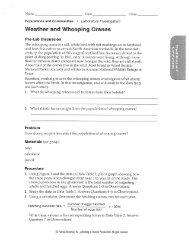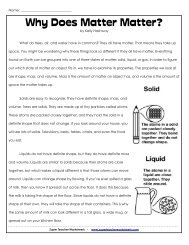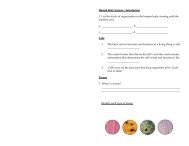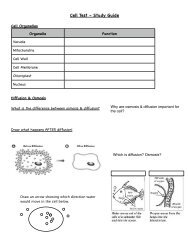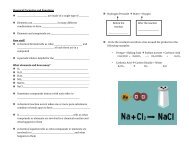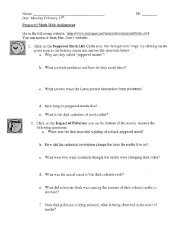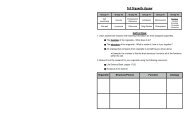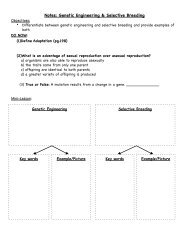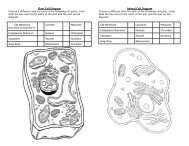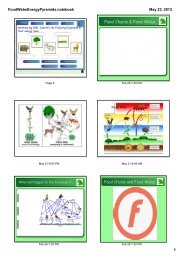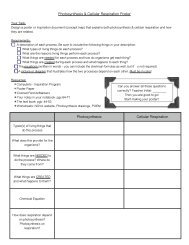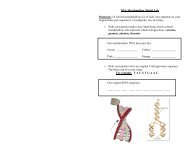Questions for Leaf Color Article - Century Life Science
Questions for Leaf Color Article - Century Life Science
Questions for Leaf Color Article - Century Life Science
Create successful ePaper yourself
Turn your PDF publications into a flip-book with our unique Google optimized e-Paper software.
Name: ________________________________ Period: 2 4 5 6 7Change in <strong>Leaf</strong> <strong>Color</strong>: Question SheetBEFORE reading:1. What types of trees lose their leaves in the autumn?2. How colorful is fall foliage in your part of the country?DURING reading:1. What is chlorophyll?2. What happens in photosynthesis?3. What’s unusual or unexpected about leaves turning red?4. Give three reasons why leaves might turn red?5. How are the colors of leaves affected by weather conditions?AFTER reading: Choose 2 of the 5 to answer, on the back of this sheet. Some require internet researching.1. Many of us find leaves of different colors to be beautiful. <strong>Science</strong> offers explanations <strong>for</strong> this beauty. Doyou think it’s important to understand the reasons why something is beautiful to enjoy it fully? Why orwhy not?2. Do you think it’s strange that someone studying leaves and their colors would be at a university inFlorida? Why or why not?3. No one knows exactly how global warming will affect trees and <strong>for</strong>ests. What are some possible effectsor changes that might occur? See yosemite.epa.gov/OAR/globalwarming.nsf/content/ImpactsForests.html (U.S. Environmental Protection Agency).4. Name three types of trees that are especially colorful in the fall. See scifun.chem.wisc.edu/chemweek/fallcolr/fallcolr.html (University of Wisconsin) or harvard<strong>for</strong>est.fas.harvard.edu/research/leaves/autumn_leaves.html(Harvard University).5. What gives red-colored plants their color? See dnr.wi.gov/org/caer/ce/eek/veg/trees/treestruecolor.htm(Wisconsin Department of Natural Resources).
Catching Some Rays: Question SheetBe<strong>for</strong>e reading:1. Why are people interested in developing alternative <strong>for</strong>ms of energy?2. How do plants create energy? How do people obtain energy?During reading:1. Why are scientists studying how algae make energy?2. Why is the sun an important part of this research?3. What is our main source of energy right now? What is the problem with using4. that source?5. Why are scientists interested in using hydrogen as fuel?6. In what way are algae useful to scientists as they study hydrogen? What7. problems might they pose?8. What does Daniel Nocera mean when he says, “We’re all busily working away to9. try to figure out how to make [photosynthesis] happen outside of the leaf”?
After reading: Choose 2 of the 3 to answer in the blank space below.1. The article mentions various ways of making alternative energy. Which way do2. you think is the most likely to solve the world’s energy problems? Why?3. Carbon dioxide sometimes <strong>for</strong>ms naturally and sometimes <strong>for</strong>ms because of4. human activities. Explain how, even though it can be natural, it can harm the5. environment.6. Solar panels, like algae, capture energy from the sun. Why do you think the7. article didn’t focus on solar panels? What is different about how solar panels8. capture solar energy and how algae do it?


